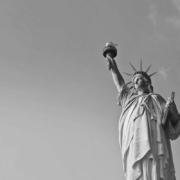Yellen Secures Economic Wins
There’s something almost too poetic about watching the U.S. economy recover under Janet Yellen’s leadership. Poetic in the sense that it feels like watching an old friend rebuild their life after a hard fall. You cheer them on because you’ve seen them at their lowest, and now, maybe for the first time in a while, they seem like they’ve got a handle on things. It’s the hope and uncertainty that make the story compelling, relatable even.
In the past few years, we’ve all been part of this economic rollercoaster, clinging to the safety bar while we hear the metallic clinks of rising inflation, the drop in consumer confidence, and the loop-de-loops of regional bank failures. And just when it felt like the ride was too unpredictable, Yellen steps in as the reassuring voice over the PA system, promising smoother tracks ahead.
The Fragility of Strength
For all her reserved public persona, Yellen isn’t afraid to tackle big issues head-on. The woman’s got grit. In her most recent remarks, she painted a broad picture of where we stand as a nation—acknowledging the complexities of our relationship with global heavyweights like China, all while keeping an eye on domestic priorities like inflation and financial stability.
This isn’t to say that she’s got some magical, flawless roadmap. Nobody does. But the recent numbers don’t lie. The United States has achieved the strongest post-pandemic recovery among major advanced economies. Unemployment is holding steady near historic lows, which sounds like something straight out of an overly optimistic Econ 101 lecture. Only, it’s real life now, and while Yellen’s team might not always get a gold star, they’re getting results.
There’s a delicate irony here. Stability is the product of hard work—constant, repetitive, unseen hard work. Like fixing up a house, you’re never really done with it. But when you’re inside, enjoying the warmth, you don’t think much about the insulation or the wiring behind the walls. That’s sort of what Yellen’s job is like: making sure the economy’s guts are strong enough to keep everyone comfortable.
Rethinking Security: The U.S. and China
Yellen isn’t just fighting fires on the homefront. She’s also navigating the ongoing economic chess match with China. It’s almost like watching two old rivals engage in a verbal sparring match, knowing full well that neither side can afford to throw a real punch. And while there’s talk about maintaining a “healthy economic relationship,” there’s also a growing narrative of resilience. The U.S. isn’t looking to back down, and neither is China. But Yellen’s recent speeches suggest she believes in America’s staying power.
Maybe I’m biased, but there’s something reassuring about that message. It’s like when you tell your kids, “Look, I know this is hard, but you’ve got this.” And we’re the kids here, wondering if all these global power plays are going to leave us without a chair when the music stops. Yellen seems to think we’ll keep dancing.
Inflation: The Uninvited Dinner Guest
There’s an old saying, “Houseguests are like fish—they start to smell after three days.” Inflation’s been hanging around like an unwanted guest for what feels like years, and Yellen knows it. Sure, we’ve made progress in beating it back, but it’s still hovering in the background like that persistent in-law who comments on your life choices at Thanksgiving.
But it’s not just about pushing inflation down. It’s about making sure we don’t compromise on the economic gains we’ve fought so hard to achieve. The dance between growth and stability isn’t easy. It’s a bit like holding your kid’s bicycle and running alongside until they’re confident enough to ride alone. And sometimes, that means you get a little banged up in the process. But Yellen’s approach seems to say, “It’s worth it.” Worth the effort, worth the bruises.
Why This Matters to Us
We all like to think of the economy as this big, abstract thing—charts, numbers, stock tickers. But it’s not. It’s us. It’s our jobs, our businesses, our families. Every policy decision trickles down in ways we don’t always recognize until they’re in our faces.
Think about how the banking sector responded to those regional failures earlier this year. When those headlines hit, there was panic—like when you’re trying to find your kid in a crowded mall and can’t see them for five seconds. Yellen’s actions weren’t flashy, but they were critical: a quiet recalibration that restored confidence and kept everyone moving forward. It’s these little things that add up to bigger things, and frankly, it’s easy to overlook them.
A Lesson in Resilience
If there’s a takeaway from watching Yellen work, it’s that resilience isn’t about eliminating risk; it’s about managing it. You can’t plan for every curveball, but you can practice your swing. Maybe that’s why the economy’s post-pandemic recovery feels like something worth celebrating. It’s not perfect, and there are more challenges ahead, but it’s progress.
In moments like these, it’s essential to appreciate that while we can’t control everything, we can make decisions that build resilience. That’s what Yellen’s doing—running the marathon instead of sprinting to the next shiny object.
Final Thoughts
When I think about the U.S. economy right now, I can’t help but reflect on how it mirrors our lives: uncertain, sometimes chaotic, but ultimately resilient. And Yellen, for all her careful calculations, seems to understand that resilience isn’t about predicting the future. It’s about preparing for it.
If you’re in a corporate finance role and want to keep up with the latest insights, join our conversation on The Schlott Company’s blog. After all, understanding these shifts isn’t just about numbers; it’s about seeing the bigger picture.
And if you enjoyed reading this, don’t forget to share it. The more of us who engage with these topics, the stronger we become. Because at the end of the day, the economy isn’t some far-off concept—it’s all of us, together.









Leave a Reply
Want to join the discussion?Feel free to contribute!